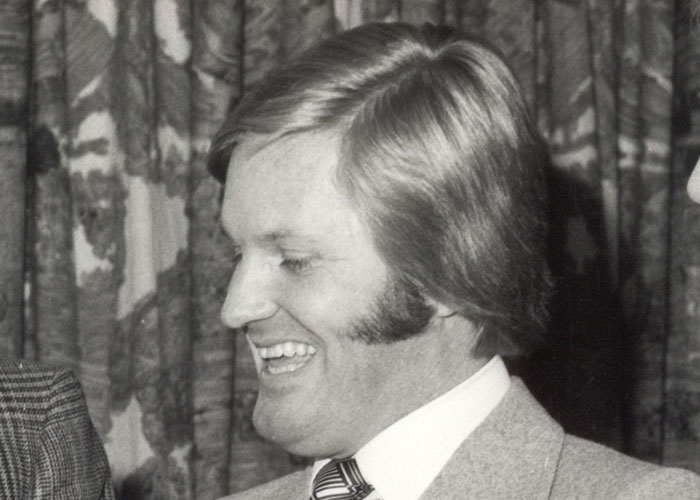To paraphrase Dante’s Divine Comedy, “in the midway” of his career in the television content distribution business, Richard Christopher Milnes found himself in a “gloomy wood” of intrigue and secrecy. The year was 1971, exactly 10 years after he had “entered this wonderful business” by joining London’s Television International Enterprises (TIE), where he reported directly to Colonel David Stirling (1915-1990).
In 1941, Stirling (later known as Sir David), a rich Scottish kid who had been thrown out of Cambridge for gambling and drinking, founded the Special Air Service (SAS) force as he served with the Commandos in World War II. Before being captured by the Italians in North Africa, German Field Marshall Rommel dubbed him the “Phantom Major,” and Britain’s Commander Field Marshall Montgomery described him as “mad, quite mad.” He was rumored to have personally strangled 41 men.
In the 1970s Stirling was associated with covert military action in the Middle East, while running TIE out of the same offices as Watchguard International, Ltd., a covert firm through which he trained security units for service in Arab and African countries.
Of his years with TIE, Milnes remembers that during trips to the Middle East Stirling often asked him to “deliver brown envelopes.” Milnes had no clue what was in them, he explained. “But they were very interesting deliveries.”
Stirling reentered the U.K.’s public consciousness in the aftermath of the 1974 miners’ strike, when he set up another shadowy organization called GB-75, which offered to recruit civilians to counter left-wing anarchist groups and an imminent mass strike.
But Milnes did not stay with TIE long enough to witness much covert action. In 1972, he left the group to join Anglo-EMI Film Distributors as a European sales executive, where he covered both theatrical and television sales throughout Europe, Israel, and Cuba.
Milnes served two tours of duty with EMI: 1972-1978 and 1980-1985. Throughout his active 42-year TV career, he also worked for Granada Theatres, United Artists Television, Alliance International Film Distributors, ITC, J&M Films, Weintraub Entertainment, Warner Bros., and Channel 5 International, before “trying to retire” in 2003 at age 60. He now lives north of London, in Felden, and works as a TV consultant.
The list of his former bosses reads like a who’s who of television luminaries: Marvin Goodman (UA), Mike Dann (CTW), Lord Bernard Delfont (EMI), Roger Gimbel (EMI), Lord Lew Grade (ITC), Gary Dartnall (EMI), Jerry Weintraub (WEG), Michael J. Solomon (WB), and David Elstein (Channel 5).
When he started out in the entertainment business in 1961 at the tender age of 18, Milnes served as an office boy at Century Theatre, one of Granada’s 34 theaters in London (out of 64 nationwide). That theater was razed to the ground in 1965 to extend what was then known as St Pancras Town Hall in North London (and is now called Camden Town Hall). Granada, founded in Dover in 1930, was awarded a TV franchise in 1954 for North West England. The company merged with Carlton Communications in 2004 to become ITV.
Milnes was a product of what was then called a public school in his native North London. But, he explained, “Mill Hill School was a private fee-paying school where I boarded for nine months of each year, and was not allowed out.”
While that sort of draconian setting might have hindered some, it was great for Milnes, who treasured his time on campus and became president of the school’s film society, which looked good on his resume when he applied for the job at the Century Theatre. Milnes gradually inched his way up on the responsibility ladder until he came to control the group’s entire London weekday booking.
This lasted until 1966, when he joined Alliance International Film Distributors, an entertainment company founded a year earlier by British film producers Sidney Box (1907-1983), Michael Bromhead (1924-), and William J. Gell (1920-2006), with financial contributions from Greek shipping magnate Stavros Niarchos.
Three years later, Milnes went to work for United Artists Television (UATV) as its European sales manager, reporting to Marvin Goodman in New York. Very little information can be found about the UATV of that period. Recalled Elie Wahba, who knew Goodman, and who recently retired after 50 years with 20th Century Fox TV Distribution, LATAM: “Marvin was VP of International Distribution, reporting to Herb Banker. He had been my boss for a couple of years and he was a good professional. Unfortunately, he passed away at the young age of 47.”
The UATV job lasted until 1971, when Milnes joined TIE, the entertainment group founded 12 years earlier by the mysterious Colonel Stirling.
TIE, which is no longer operational, is not to be confused with the current Wigan, Lancashire-based Television International Enterprises and Archives (TIEA), which, according to its current chairman Phil Morris, is an offshoot of TIE, but was created in 2006 — well after TIE ceased operations in 1980.
The original TIE was born in 1959 and was a key player in the television industry in the early 1970s. The company was created by Stirling to help third-world countries establish TV and radio stations in Africa, the Middle East, and Commonwealth countries, including the Caribbean. These were meant to mainly be for educational purposes. TIE, however, was also a program distributor.
Because of this educational element, TIE distributed series from the New York-based Children’s Television Workshop (abbreviated as CTW and now as SW for Sesame Workshop), including Sesame Street and The Electric Company, in Europe, Africa, the Middle East, and the Far East. Of those years, Milnes remembers when he took CTW vice president Michael H. Dann to his first visit behind the “Iron Curtain” to attend the 1971 Brno Film Forum in Czechoslovakia. Dann (1921-2016) was a TV legend, having served as CBS’s vice president of programming from 1963 to 1970.
At TIE, Milnes also distributed U.S. TV network series such as The Lucy Show (on CBS from 1962 to 1968) and The Doris Day Show (on CBS from 1968 to 1973) in Europe, Africa, the Middle East, and the Far East.
Milnes explained how TIE ended up distributing those two prized TV series: “John Pearson, who used to head up International Sales at Desilu Studios in Hollywood, departed Desilu two years after Paramount took over, and in 1969 he set up his own television distribution company, John Pearson International (JPI). He was so well liked by [Desilu founders] Lucille Ball and Desi Arnaz that they gave him the international sales (outside the U.S.) of The Lucy Show [Ball’s follow-up to I Love Lucy, which was distributed by Paramount]. In turn, John negotiated a deal with TIE for us to handle the sales in Europe, the Middle East, and Africa.”
Pearson began on his own by selling a single series, Here’s Lucy, Ball’s third network sitcom, which ran on CBS from 1968 to 1974. He later added other popular shows such as The Lucy Show, The Doris Day Show, Lassie, The Lone Ranger, and The Andy Williams Show. However, JPI was sold in 1982 and the distribution rights to Here’s Lucy passed to Telepictures, which guaranteed $3 million to Lucille Ball Productions for the exclusive worldwide syndication of the 144 half-hours. After JPI was sold, Pearson founded Harhill Media.
The British-born John Elliot Pearson (1916-1997) served with the British Army during World War II, but wasn’t tied to TIE’s Stirling. The link between TIE and JPI was Peter Orton (1943-2007), who worked in sales at TIE and knew Pearson. Orton also took Sesame Street to TIE before he left the company to join CTW. In 1989, Orton founded HIT Entertainment, which was sold in 2005.
Pearson went to New York to work for Lew Grade’s ITC in 1960. Four years later, he traveled to Hollywood to work for Desilu Studios.
During his stint at TIE, Milnes had the opportunity to visit a group of smaller TV stations in Trinidad and Tobago, Jamaica, Barbados, Gibraltar, Malta, Kenya, Sierra Leone, Saudi Arabia, Sudan, and Ethiopia. Milnes explained that “in order to get the majors and other big distributors to make it worth their while to sell us 16 mm prints at reasonable prices, we grouped license fees together. Then, we would bicycle the print of each episode around to all our stations. In those days it was a good business,” he said.
After that globetrotting experience, Milnes began his first tour of EMI Films in 1972. Four years later he was appointed to its Board of Directors. His board duties were added to his responsibilities of running the Latin American TV Sales division under the feared, admired, and sometimes-despised Nat Cohen (1905-1988).
In 1977, under the leadership of Lord Bernard Delfont, Milnes was appointed EMI Films’ director of Television Sales Worldwide, with the added responsibility of liaising with renowned American producer Roger Gimbel (1925-2011), who headed EMI’s television productions.
But just a year later, Milnes left Lord Delfont to join his brother, Lord Lew Grade, at ITC. Delfont (1909-1994) was born as Boruch Winogradsky in Tokmak, Ukraine and became EMI’s CEO in 1979. Grade was born as Lovat Winogradsky (1906-1998) and founded ITC in 1954. Milnes believes that he is “one of the few who worked for both Delfont and Grade.”
In 1980, Milnes returned to EMI Film Distributors, and three years later was sent to Los Angeles for a brief stint as VP of Marketing and Acquisitions, this time for EMI’s new entity, Thorn EMI Films.
Milnes was acclimated to California since he traveled there extensively in the ’70s during his first tour with EMI. But just 11 months into this new role, he was asked to return to London to participate in the restructuring of all Thorn EMI entertainment businesses under the umbrella of Thorn EMI Screen Entertainment (TESE), which included EMI Elstree Studios, ABC Cinema circuit, Thorn EMI Productions, International Theatrical, Television and Video Distribution, as well as U.K. Distribution. Milnes ran all of TESE’s International Distribution out of London.
During his two stints at EMI Films, Milnes became part of the evolution and devolution of the group, which started under Bryan Forbes (born John Theobald Clarke, 1926-2013), from 1969 to 1971. From 1970 to 1973, the U.K. distribution company of EMI Films became MGM-EMI (due to a co-venture with the U.S. studio), while the international arm was Anglo-EMI Film Distributors, which ran autonomously under Nat Cohen. Anglo-Amalgamated (which was co-founded in London by Cohen in 1931) was bought by EMI in 1969. Anglo-EMI was integrated into EMI Films under Cohen in 1972 (before his resignation in 1977). In 1979, EMI merged with Thorn Electrical Industries and became Thorn EMI Films. In 1983, it became TESE, and was under the leadership of Gary Dartnall (1937-). TESE was sold to Alan Bond in 1986.
Strangely, two companies for which Milnes worked — ITC and TESE — both fell under the ax of Australians. ITC fell to raider Robert Holmes á Court (1937-1990) in 1982, and TESE to Alan Bond (1938-2015) in 1986. One week after purchasing TESE, Bond flipped it over to Israel’s Cannon Group. The following year, Cannon sold TESE’s film-TV library to Weintraub Entertainment Group (WEG). In 1992, Bond declared bankruptcy and was subsequently convicted of fraud against Holmes á Court’s company and imprisoned in Australia. Cannon was folded into Pathé in 1989.
WEG’s takeover of TESE’s library in 1987 marks when Milnes went to work for Jerry Weintraub as EVP of Worldwide Sales and Marketing in London. “On behalf of Jerry, Larry Gershman had approached me to run the International Theatrical, Television, and Video Sales [division] for WEG,” recalled Milnes. At that time Gershman was consulting with WEG while firming up plans to start WIN after leaving MGM.
But that was two years after Milnes had left TESE in 1985 and had joined J & M Films, a company started in 1978 by Julia Palau and Michael Ryan. In 2000, the U.K.-based company was sold to a German entity.
After five years with WEG, Milnes said, “Michael J. Solomon appointed me as VP of Warner Bros. International U.K. [He was] the best boss I ever worked for.”
Milnes stayed with WB for eight years, leaving in 2000 to establish the International division of Channel 5, the U.K.’s fifth FTA channel. Milnes served as C5 International’s CEO for three years. Later, he developed his own consultancy company.
“I decided to retire at 60,” recalled Milnes. “Big mistake! So after a few months I helped my youngest son David launch 2Create Film & Television Ltd, a corporate video producer, and consulted for several companies. Currently, I am consulting for ArchAngel Productions. I am on the advisory board of the production company Decent Media, and president of Old Albanian, a rugby club in St Albans, Hertfordshire.”
To conclude on a lighter note, VideoAge asked those who knew Milnes best to offer up a few nuggets about his life and times. U.K. TV veteran Bob Jenkins suggested asking Milnes about a watch gifted to him by Warner Bros.
“In 1993, [WB president] Solomon flew my wife Beryl and two sons, Alistair and David, to L.A. to celebrate my 50th birthday,” Milnes explained. But he didn’t get a Rolex, like he thought he would. Instead, “it was a beautiful gold Bugs Bunny watch,” he clarified.
Meanwhile, Greg Phillips, president of Distribution at Kew Media, said to ask Milnes about something that he called “the Karlovy Vary humiliation.”
Milnes explained: “That was when I encouraged a young Greg Phillips — I gave him his first job at Anglo-EMI in 1972, after he left school — to join me and play in a film festival’s all-star male team against the local girls’ football [soccer] team,” he recalled.
“We were well beaten — five goals to two — and one of the girls broke our goalkeeper’s leg. Like me, Greg was not that fit, and the girls ran rings around both of us. The game took place in their huge Karlovy Vary Football Stadium [in the Czech Republic] with hundreds of local spectators.”
(By Dom Serafini)
Audio Version (a DV Works service)










Leave A Comment